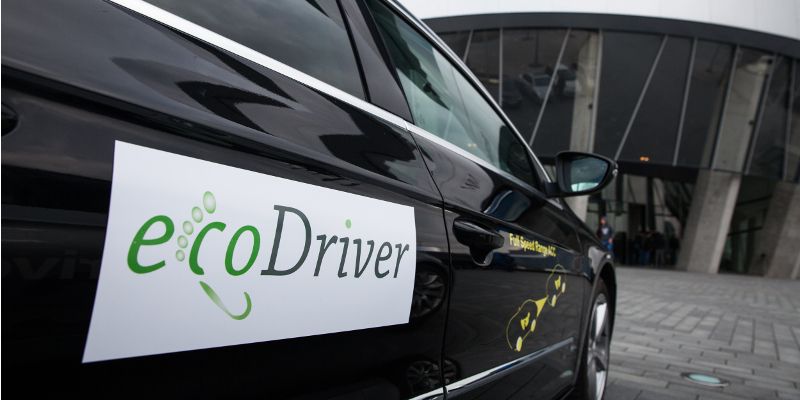
Cars of the future which advise how to drive more safely and economically could bring significant cuts in fuel consumption and emissions.
Eco-driving systems offer visual guidance to drivers, usually built in to satellite navigation systems or via smartphone apps.
The systems are not yet widely available, but manufacturers are looking at installing them in their next generation of cars.
The ecoDriver project, led by the Institute for Transport Studies at Leeds with industry partners including BMW, Daimler, CRF (Fiat-Chrysler) and TomTom Telematics, showed that drivers of cars which had such systems installed saved an average of 4.2% in fuel and CO2 emissions, with an even higher saving of 5.8% on rural roads.
Embedded systems – ones built in to vehicles – were more effective than apps, with fuel savings of up to 6% (against an average 2.5% for the smartphone app).
The findings are the aggregated results of on-road trials in 2014-2015, which involved nine separate trial locations in seven EU countries, including around 200 drivers, 61 vehicles, 11 different systems and a total of 340,000 km driven.
Professor Oliver Carsten, Professor of Transport Safety and ecoDriver co-ordinator, said: “The results from our trials with a large range of eco-driving systems indicate substantial fuel and energy savings can be gained when drivers are given precisely tailored advice on the best speed and gear for cutting fuel costs and emissions, as well as foresight of how to drive when approaching a particular road or traffic situation.
“These systems can make a real contribution to reducing the carbon impact of road transport as well as saving fuel costs. The systems also deliver important safety benefits by encouraging drivers to reduce their speed.”
The ecoDriver systems proved to have strong positive impacts on speed, time headway, and accelerations and decelerations. This should translate into fewer and less severe crashes.
Specifically, when the ecoDriver system included an indication of the recommended speed, the average speed was reduced by 2 to 4%. A significant reduction in speed was also observed before sharp curves on rural roads when using the embedded systems.
“Road transport contributes about one-fifth of total CO2 emissions in the EU,” said Hermann Meyer, chief executive of ERTICO, a partnership of around 100 companies and institutions involved in the production of intelligent transport systems.
“Advances have been made in terms of cleaner vehicles, traffic management, efficiency and intermodality, but the final link is the driver. Driving behaviour has a major influence on fuel use and emissions.
“Projects such as ecoDriver allow us to test drivers’ behaviour in real life and represent an important contribution to increase safety on European roads while promoting eco-driving.”
After four years of research funded by the European Union, ecoDriver’s final event took place in Stuttgart, Germany, where seven vehicles, from cars to a minivan to a truck, demonstrated the different systems developed by the project partners.
Further information
Professor Oliver Carsten is available for interview. Contact the University of Leeds press office on 0113 343 4031 or email pressoffice@leeds.ac.uk
The ecoDriver project aimed to support drivers (car, bus and truck) in conserving energy and reducing emissions. The prototypes developed in this project encourage drivers to adopt green driving behaviour: drivers receive eco-driving recommendations and feedback adapted to them and to their vehicle characteristics.
A range of driving profiles, powertrains (conventional, hybrid, electric) and vehicles types (passenger cars, vans, trucks, buses) were tested in this project in order to optimise the driver-powertrain-environment feedback loop. The ultimate goal was to deliver the most appropriate eco-driving advice or feedback for any given situation.
The 12 ecoDriver partners: University of Leeds (coordinator), ERTICO – ITS Europe, BMW, TNO (Netherlands Organisation for Applied Scientific Research), VTI (Swedish National Road and Transport Research Institute), CTAG (Automotive Technology Centre of Galicia), TomTom Telematics, IKA (RWTH Aachen University), IFSTTAR (French Institute of Science and Technology for Transport, Development and Networks), CRF (Fiat Research Centre), Daimler, and simotion (a German software and simulation engineering company).